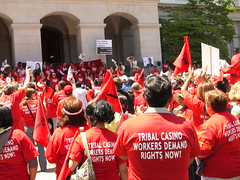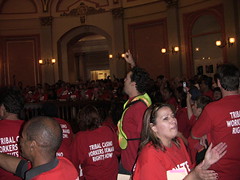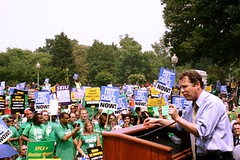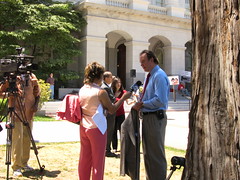(I love me some liveblogging. Just so everyone is clear: SB 840 is Keuhl’s single payer bill and AB 8 is the Nunez/Perata bill that stays within the private insurance model. – promoted by juls)
Things are about to get underway as It’s OUR Healthcare! will be liveblogging from the John L. Burton Hearing Room where the Senate Health Committee chaired by SB 840 author, State Senator Sheila Kuehl (D-Santa Monica), will meet at 1:30pm.
Senator Kuehl is setting the ground rules for the hearing. (No cheering, clapping or booing.)
Scheduled to speak are the Speaker of the Assembly Fabian Nunez (D-Los Angeles) and Senate President Pro Tem Don Perata (D-Oakland).
Check for updates below the fold.
Speaker Nunez has just arrived and will start the discussion on AB 8. Senate Pro Tem seated right beside him.
In front of Senator Kuehl is a white sign with black text: “DO NO HARM.”
Speaker Nunez says that he and Perata are pleased to be here to make a major step in ailing a system that is broken.
Nunez: [Kuehl] You are a champion of healthcare for all Californians.
Nunez: AB 8 built on the idea of shared responsibility between employers, government and individuals. These measures will not fix the entire healthcare market, but improve it. This is a rare opportunity to fundamentally improve our healthcare system. We need to act now; take advantage of this opportunity.
Nunez: All of the uninsured children in California will be covered by this legislation. It will move 3.4 million (of the 6.5 million) under coverage.
Nunez: This is not a perfect plan, but will help pave the way for “real healthcare reform.”
Senator Perata now at the podium.
Perata: “[Bills merged because] we got tired talking to each other. We wanted to talk to the Governor.” Says we should have a national healthcare program. “Scandalous” that the U.S. is “woeful” on healthcare. California must provide the leadership [for the country].
Kuehl: In MA, they just added “affordable” to the name.
Witness: (Speaking of SB 840 support) “It seems like Kuehl’s gang were all over the place.” Kuehl replied jokingly, “Kuehl’s angels, we call them,” and the room chuckled.
Angie Wei, California Labor Fed acknowledged the huge number of IOH supporters that have traveled from across the state today. Provisions supported: Creation of statewide purchasing pool; establishment minimum of healthcare spending requirement; subsidies and discounts for families below 300% poverty level.
Concerns: issue of cost containment (union members have been able to hold on to their healthcare but pay a dear price for that; early retirees face risk of losing their healthcare; current system is unsustainable); affordability (we need to protect families from maximum exposure out of pocket).
Beth Capell, Health Access California: [Legislators] have been receiving healthcare Stories of the Day. Retells her own personal healthcare story involving her husband. “Never once did we worry we whether we could pay for his care. It should be that way for everyone.”
Number of studies released today on employer-based coverage. AB 8 would have a modest, yet positive, impact on California’s economy and not cost jobs.
Capell: We can do something this year that will improve the economy and help with people’s care.
Witness: AB 8 would improve healthcare for low-income Californians.
Mary Hernandez, SEIU: We support AB 8 if amended to control healthcare costs.
Gary Passmore, Congress of California Seniors: Add amendments on two issues for support; truly a work in progress; “we like what we see”
Consumers Union: support if amended; transparency a must;
AFSCME: We want to make sure this bill includes cost controls.
California Medical Association: support if amended; refinement of cost control efforts; inclusion of fiscal transparency
CNA voiced opposition to AB 8, instead favoring SB 840.
Senator Sam Aanestad (R-Grass Valley) suggested to the Speaker that he work with the chair, put a hold on the bill and work on it through the fall.
Kuehl: “I don’t like your bill as much as I like my bill.” (The assembled crowd laughed.)
Kuehl: If we had the right Governor, we’d have it (SB 840). But my responsibility, is to now. Responsibility to push as hard as I can to hammer on the issues at hand. I am going to support this bill today (AB 8). It must keep moving to have a vehicle better than the Governor’s plan.
Nunez: Your bill (SB 840) is not only a bill that I not only support, but enthusiastically support. AB 8 is not perfect but will help a lot of people — 3.4 million.
Kuehl voted in favor of AB 8, vote is currently still open.





